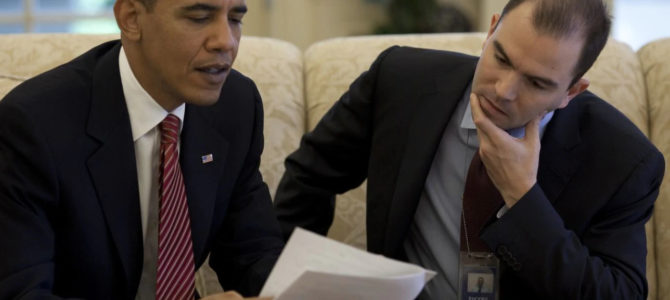
When I finally got to the end of a supposed blockbuster piece by the New Yorker’s Adam Entous and Ronan Farrow regarding a dark conspiracy theory that had been spreading within the Trump White House, I was struck by two things: 1) the innocuousness of the memo in question, and 2) how the basis of the memo was plainly true. The piece, in fact, goes a long way in substantiating the memo’s contention about the media, allowing former Obama administration officials and their allies to offer ludicrous claims without even a scintilla of journalistic skepticism.
To put the reporting in some perspective, the memo is 478 words long. Much of the short document is nothing more than names and titles. The breathless piece, more conspiratorial than the memo, contains 1,360 words of assumptions and misleading characterizations about the both the document and Obama officials.
Here is a taste: “Some of the same conspiracy theories expressed in the memo appear in internal documents from an Israeli private-intelligence firm that mounted a covert effort to collect damaging information about aides to President Obama who had advocated for the Iran deal,” claims the New Yorker.
For one thing, you don’t need an Israeli private-intelligence firm (in this case, the scary sounding and secretive “Black Cube”) to write a run-of-the-mill political oppo memo that could have been thrown together by anyone using public reports in less than an hour. This was my thought as I fruitlessly read the piece once again searching for these supposed conspiracy theories.
The unsigned memo alleges that the “communications infrastructure” of the Obama White House that was used to “sell Obamacare and the Iran Deal to the public” had been moved to the private sector. This is a circumstance known to be true to anyone who’s paid any attention to the news over the past two years. The memo also cites former Deputy National Security Advisor Ben Rhodes as “likely the brain behind this operation” and Colin Kahl, Vice-President Joe Biden’s former national-security adviser, as its “likely ops chief.” All this is “likely” true.
Rhodes and Kahl told the reporters that the “allegations” are false “and no such organization exists.” That’s nice. But the memo doesn’t say anything about being part of an official “organization,” it claims there is a “communications infrastructure” engaged in undermining the administration. People can work in concerted ways without being official members of SPECTRE.
So, a more useful question for Rhodes (and others) would have been: ‘Do you communicate with the former Obama officials named in the memo to plan and implement strategies intended to undercut the Trump administration’s foreign policy goals — especially on Iran? For instance, did you have a role in former Secretary of State John Kerry’s meeting with Iran’s foreign minister and other world leaders and diplomats to save the nuclear deal despite the official position of the U.S. government? Do you engage in any other shadow diplomacy?’
Or perhaps they could have asked, ‘Do you, or do you know if other former Obama officials continue to leak intel they have gathered from allies still working in government to feed it to friendly reporters at mainstream media outlets? Do these reporters, at places like The Atlantic, NBC News and CNN, still regurgitate those politically motivated leaks willingly and without question, as you once claimed?’
Now, of course, NBC News’s Andrea Mitchell or The New York Times’ Max Fisher aren’t sitting down and plotting their pro-Iran talking points with former Obama officials; but in effect, it doesn’t matter. Both of them, and many other supposedly unbiased journalists, simultaneously parroted a litany of lies that Iran-deal proponents fed (or signaled) to them.
Fisher’s work is particularly embarrassing, because his shilling is rife with rudimentary mistakes that even an amateur observer of the Middle East could probably avoid. Then again, Fisher is also the type of pliable journalist that Rhodes cultivated to repeat misinformation. It was in The New York Times that Rhodes — not some shady memo author or scary Israeli black ops group — said, “We created an echo chamber.”
The New Yorker story notes that in his recent memoir, Rhodes walked back his boast, contending that “all I was describing was the most routine aspect of communications work. Briefing people. Disseminating fact sheets.” But that’s not what he said at the time, and it’s not what the evidence demonstrates. “They were saying things that validated what we had given them to say,” Rhodes maintained. That’s what they did, and that’s what they still do. Though he probably regrets boasting about how easy it was to dupe willing reporters, the idea that that he was talking about commonplace PR work is also absurd.
The New Yorker piece dresses up a non-story with politically titillating buzzwords and speculative intrigues (the memo, it claims, resembled a “U.S. military-intelligence officer’s analysis of a foreign-insurgent network”) that allow Obama officials, with their usual dismissive smugness, to tee-off on strawmen and create the impression that anyone concerned about their Iran-boosterism is paranoid. And while, admittedly, the National Security Council should not be a place to send out political memos (though the idea that it is apolitical is laughable), it’s certainly not a conspiracy theory to point out that the underlying message of the memo is factual.








